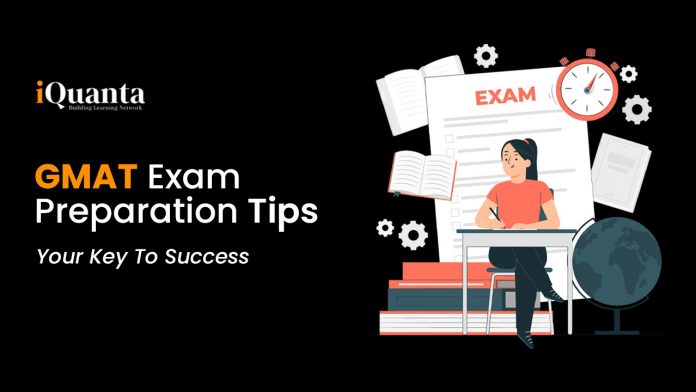As a GMAT aspirant, are you looking for GMAT exam preparation tips that will help you succeed with the desired score? We decided to help you get started.
GMAT is an exam that tests only your Math and English skills. The key to cracking any entrance exam is self-discipline and consistency. If you can stay focused, then one way to prepare for the exam is self-study. But personally, I feel it is exhausting, as you have to arrange everything yourself – from finding the best study material to mock tests/practice papers. Moreover, if you get stuck on a question, the help is not readily available.
Another, much preferred preparation method is to join a GMAT Online Coaching where you can excel under the mentorship of an expert teacher. At iQuanta, we prepare aspirants for the GMAT exam by providing professional guidance, 24×7 support, relevant and updated study material, mock tests, live classes, and video lessons to ensure a competitive edge.
What Is GMAT?
GMAT is an online exam that’s accepted by various B-schools in India, the U.S. and other countries for admission to management programs. It is a computer-based test. A score of 700+ out of 800 is considered a good score. GMAT is a primary factor that’s considered for acceptance in top business schools globally, but it isn’t the only criteria to secure admission.
The most important thing every aspirant needs to understand is that GMAT syllabus, concepts, sections of test, duration of the exam, number of questions, and preparation strategy are the same across the globe.
Four Sections of GMAT Exam
GMAT exam is an online test with a minimum score of 800, and is divided into four sections:
| Quantitative Reasoning |
| Verbal Reasoning |
| Analytical Writing Assessment |
| Integrated Reasoning |
Check out the GMAT syllabus for the four sections.
Check out the New GMAT Focus Edition Syllabus.
What Are The Pre-requisites For The GMAT Exam?
Before you start preparing for the GMAT exam, you must first register for the exam. Follow the below-mentioned steps to register:
- Go to the official website and register for the GMAT exam.
- Get the official GMAT materials, which include:
- The official guide to the GMAT review
- Official Quant Guide
- Official Verbal Guide
Tip: If you are opting to sit for the GMAT exam at a test centre, pick the centre/city closest to where you stay.
Before You Register For GMAT Exam, Do This
It is imperative to gather information about the B-schools you desire to apply for. So, before you register for the test, check out your desired college’s deadline. The top reputed business schools have a fixed deadline. Hence, it is advisable to register for GMAT at least 4 to 6 months in advance. This way, you wouldn’t miss your choice B-school’s application deadline, and save time planning rescheduling or cancellations at the last minute.
Before You Make A Study Plan, Do This
This is a crucial step you should follow once you have registered for the GMAT exam, and before you make a study plan. The best way to evaluate your strengths and weaknesses in each section of the GMAT exam is to write a full-length test to check your level of preparation. Remember, to write this test without any prior revision.
Effective GMAT Exam Preparation Tips
Now that you have registered successfully for the exam, below is a list of effective GMAT exam preparation tips that will help you ace your GMAT scores.
Get Familiar With Test Section
Understand the GMAT structure before you plan a strategy or decide on a study plan. Get familiar with the four test sections of the test.
- Quantitative Reasoning: This section evaluates your capacity to solve quantitative problems and interpret graphical data.
- Verbal Reasoning: This section measures your ability to read and comprehend, reason and logically evaluate the given arguments.
- Analytical Writing Assessment: This section measures your ability to think critically and present your ideas.
- Integrated Reasoning: This section tests your capacity to assess the facts and figures presented as graphs and tables.
Take a Practice Exam
Before you build a study strategy, take a practice exam to check which sections you are weak in, and which sections are your strong points. And then accordingly, you should make a study plan that gives more time for preparing the weaker subjects, and rest to improve on your strengths too.
Build a Study Plan
Your study plan depends on the time gap between your registration for the GMAT exam and the exam date. If you have registered 6 months before the chosen exam date, spend a minimum of 2 hours every day preparing for GMAT. If you have less time left for the test, then it is advisable to spend 3.5 to 4 hours every day. Give preference to weaker sections, but do not stop practicing and revising the ones you are well-versed in.
Do Not Rely on Weekend Study
Some aspirants think giving a few hours for two days in a week will be enough for GMAT preparations. Believe me, this isn’t a good idea. You need to keep in practice to ace the game. So, learn a little every day.
Prioritize Your Time – Stay Focused
Self-motivation is the key to remain focused. You should prioritize your time as per your daily study targets. Do what needs to be done. Stop procrastinating and take actions to achieve your study goals. Maintain a notepad, list the section-wise topics that should be completed by the end of the day. And keep up to your expectations.
Maintain Consistency
Staying consistent throughout your GMAT preparation can help you reach your target score. Consistency keeps you organized and dedicated towards your daily goals, making them achievable. It makes you productive, and hence you know what to expect.
Pick The Right Study Material
Aspirants waste a lot of time searching the internet to choose the apt study material to learn from. GMAT is not an easy exam. So, it is essential to pick up the right study material. You can either rely on your friends, colleagues, or hit and trial methods to select books to study from. Or join a GMAT coaching.
Benefits of Coaching
You may decide to self-study if you are well-equipped to solve your queries, have the right study material, and can stay focused on your daily study goals. This is possible, but staying consistent is not easy when you are all on your own. So, a systematic way to approach GMAT preparation is by joining a good coaching institute to make you ready for competition.
These are a few benefits of coaching:
- You follow a structured learning plan.
- You get selective material to read and practice. Thus saving you a lot of time to search for the apt books and study material.
- Regular discussions in the class and the Facebook/WhatsApp groups brush up the learning.
- Mock tests are regularly available for practice.
- Help and support is available wherever you get stuck in your studies.
Join a Peer Learning Group
All your queries are being answered in the coaching, assuming you have joined one. Now, what next? Join a peer learning group to know how other aspirants are preparing, to get help in solving questions you need help with, and to evaluate your learnings by helping others. Looking for a peer group, join iQuanta’s GMAT Preparation Facebook group to receive help and practice questions from our expert mentors and other aspirants.
Attempt Mocks and Analyze
You should attempt mocks twice or three times per week to evaluate your progress. After every mock, analyze it, one section at a time. It means, analyze one section first, know the mistakes, revise and practice the wrong questions from this section. Once done, move to evaluate the next section. Understand the mistakes, revise and practice. Repeat these steps for the four sections.
Master Quant and Verbal Section
Give equal time to prepare for both quant and verbal sections, but master one of these to help you score higher. If verbal is your strength, learn it thoroughly. If you are strong in quants, then practice it rigorously. Use shortcuts and tricks to your advantage to solve the quantitative reasoning section in a short period. Brainstorm for the verbal section. Think logically, analytically and critically to solve verbal reasoning questions.
Do Not Ignore IR and AWA
Integrated reasoning and analytical writing assessment marks are not included in the final scores. And so you may not devote ample time preparing for these two sections seriously. Nevertheless, remember their marks are mentioned in the mark sheet. And some colleges consider these mark sheets internally. Do your research thoroughly when applying to your preferred business schools.
Key Focus Aspect
GMAT exam preparation has two key focus aspects:
- Time Management – making daily achievable goals with the set time frame, and
- Information Management – this means finding shortcuts and tricks to solve a question with fewer efforts.
We all have 24 hours in a day. But what separates winners from others is how they manage and utilize their time to achieve what they desire. To complete the paper and attempt all questions, it is essential to learn the tricks to solve similar pattern questions quickly.
Practice Schedule
Schedule full-length GMAT practice tests every week to assess your performance. Make sure to give the practice tests as per the actual conditions of the GMAT exam.
- Do not use a calculator for the quant section or when practicing through the study material.
- Always set an alarm when solving questions – 2 minutes for questions for Quants and 1.45 minutes per question for verbal reasoning.
- Do not spend a lot of time on one question. If you are unsure, take your best guess and move on.
Remember to mix up different question types and exam sections in your practice schedule.
For aspirants, who are working full-time, join iQuanta’s GMAT course for GMAT 2024 preparation.




